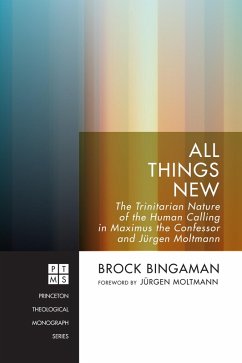For both Maximus the Confessor (c. 580-662) and Jurgen Moltmann (b. 1926), understanding what it means to be human springs from a contemplative vision of God. This comparative study explores surprising parallels between the theological anthropology of the seventh-century Byzantine monk and the contemporary German Protestant. Bingaman argues that Maximus and Moltmann root their understanding of the human calling in their Trinitarian and christological reflection, in contrast to many modern theologies that tend to devise an account of human being first, and then try to find ways in which Christ and the Trinity are somehow relevant to this human being. In this constructive work, Bingaman demonstrates the intrinsic connection between Maximus' and Moltmann's views of human being, Christ and the Trinity, the church, and the human calling in creation. Illustrating the richness of these ancient and postmodern theologies in conversation, All Things New lays out future trajectories in theological anthropology, patristic ressourcement, ecologically attuned theology and spirituality, and Orthodox-Protestant dialogue.
Dieser Download kann aus rechtlichen Gründen nur mit Rechnungsadresse in A, D ausgeliefert werden.


